
Have you been wondering what undue influence in contract law means? There is no need to worry, as I have you covered!
Like every other blog of mine, I will start with a hypothetical scenario.
Imagine feeling like you made a great deal when you signed a contract, only to find out later that you were coerced into it. That is what occurs when there is an instance of undue influence.
Some people use this cunning strategy to get what they want from others, frequently by taking advantage of their trust or vulnerability. With this loophole, the other party will not be punishable by the law in case of a breach of contract!
When it comes to contract law, undue influence is a big deal. It’s similar to a wolf in sheep’s clothing, masking deception as sincere consent.
However, there’s good news! Don’t worry! You may guard against being a victim of undue influence by knowing what it is and how it operates. And that is precisely what I am planning to do through this blog!
Therefore, keep reading this blog until the end to learn more, and thank me later…
Undue Influence in Contract Law

When someone uses their authority or power to force someone else into signing a document or making a decision against their better judgment, this is known as undue influence.
It’s similar to being pushed off balance by a strong wind and agreeing to something against your judgment.
Someone in a position of trust, such as a family member, teacher, or financial advisor, may have this influence. To get what they want from you, they may resort to emotional blackmail, lies, or guilt.
Unfair influence can be overt— like a loud demand— or subtle— like a soft murmur in your ear. Either way, you are being unfairly pressured to give up your freedom of choice.
Regarding undue influence, the party under unlawful persuasion can be under the other party’s domination (someone who is exercising the power).
They can also assume that the opposite person will not harm them through the contract because of the relationship they share1.
Imagine it is similar to a set of scales, with one side being heavier than the other. When someone exerts undue influence, they tip the odds against you, making it difficult for you to decide fairly.
Furthermore, by identifying undue influence, you can take control of the situation and make decisions that are genuinely your own.
Types of Undue Influence
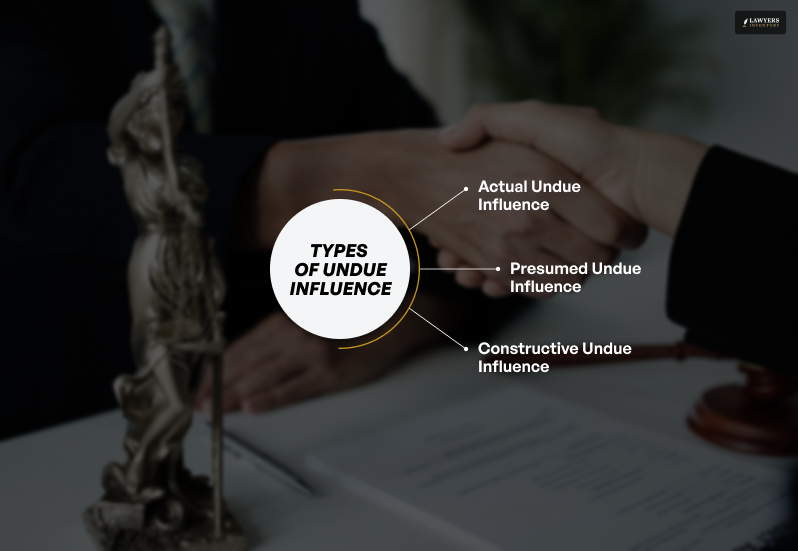
When it comes to Undue influence in contract laws, they are mainly of three types2. They are Actual, Presumed, and Constructive Undue Influence.
These categories ensure that the court can determine whether the contract had undue influence.
Now, let us take a closer look at them:
1. Actual Undue Influence
Definition: This occurs when one party uses physical or moral coercion to force the other party into a contract.
Example: A bully threatens to harm someone if they don’t sign a contract.
2. Presumed Undue Influence
Definition: This is assumed when a relationship between parties gives one party an advantage.
Example: A teacher and student, or a doctor and patient, have a natural power imbalance.
3. Constructive Undue Influence
Definition: This occurs when a party takes advantage of a position of trust or confidence to influence the other party.
Example: A financial advisor uses their expertise to convince clients to invest in a risky scheme.
Elements of Undue Influence
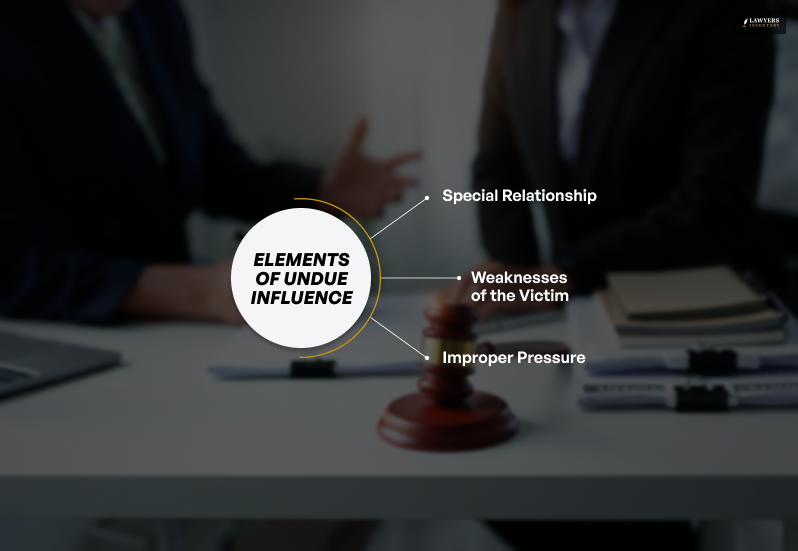
A few key elements must be present in your contract to prove that undue influence has occurred. Similar to the elements of contract law and how they work, these also are very important.
Think of these elements like a three-legged stool. If any one leg is missing, the stool won’t stand. Similarly, all three elements must be present for undue influence to occur.
Furthermore, by understanding these elements, you can better recognize when someone is trying to manipulate or coerce you into a decision that isn’t in your best interest. Additionally, awareness of these elements can help protect yourself from undue influence.
Here are the three elements of undue influence in contract law:
1. Special Relationship: Firstly, the person exerting influence must have a special connection with the victim, like a family member, guardian, or someone in a position of trust. Besides, this relationship creates a power imbalance, making the victim more vulnerable to manipulation.
2. Weaknesses of the Victim: Secondly, the victim must have vulnerabilities that make them susceptible to influence, such as age, illness, emotional distress, or lack of knowledge. These weaknesses can be physical, emotional, or mental.
3. Improper Pressure: Finally, the influencer must use improper or unlawful tactics to manipulate the victim, going beyond mere persuasion. Moreover, this can include lies, threats, emotional blackmail, or exploitation of the victim’s weaknesses.
Examples of Undue Influence
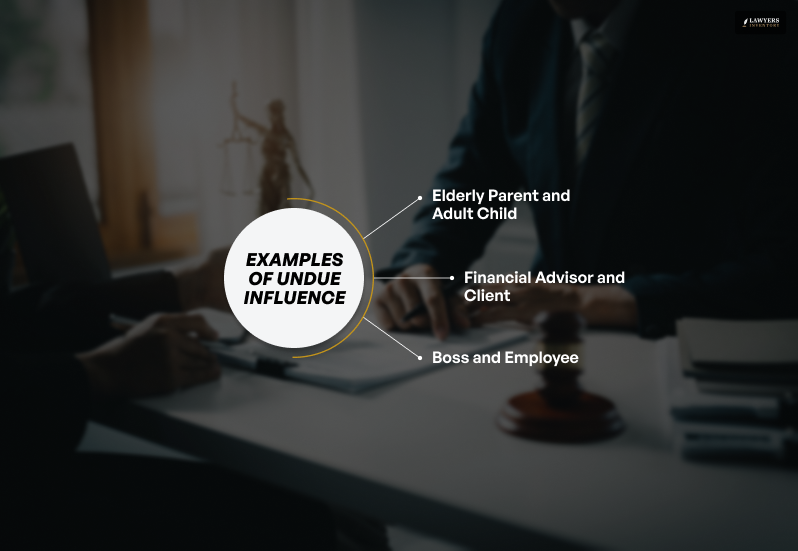
I was guessing that it would be easier for you to understand what precisely undue influence is regarding contract laws. And what better way to do so than by giving you a few scenarios?
So, let me help you understand through some common examples and dynamics:
1. Elderly Parent and Adult Child: Imagine an elderly parent who relies on their adult child for care and support. The child convinces the parent to transfer their property or assets to them, claiming it’s for the parent’s good. But in reality, the child exploits their parent’s trust and vulnerability.
2. Financial Advisor and Client: A financial advisor convinces clients to invest in a risky scheme, promising high returns. The client trusts the advisor’s expertise and needs to fully understand the risks. The advisor uses their position of trust to manipulate the client into a decision that benefits the advisor, not the client.
3. Boss and Employee: A boss demands that an employee sign a contract that heavily favors the boss, threatening to fire the employee if they don’t comply. Additionally, the employee feels coerced and signs the contract against their will.
As you can see, in these examples, someone uses their power or position to influence another person’s decision, often for their own gain. This is undue influence in action.
Additionally, recognizing these scenarios and speaking up or seeking help in a similar situation is essential.
Legal Remedies Against Undue Influence

Protecting yourself from undue influence is crucial to making free and fair decisions.
Following these steps, you can protect yourself from undue influence and ensure your decisions are yours. Remember, it’s always better to be safe than sorry; seeking help is a sign of strength, not weakness.
Here are some ways to do so:
1. Transparency: Ensure that all information is disclosed and explained in a way you understand. Make sure to sign everything with complete clarity.
2. Independent Legal Advice: Seek advice from a lawyer or expert not connected to the other party. They can help you understand the contract or decision and ensure it’s fair.
3. Review Period: Think before deciding or signing a contract. Don’t rush into anything that makes you uncomfortable.
4. Trust Your Instincts: If something feels off or you’re unsure, trust your instincts and don’t proceed.
5. Seek Support: Surround yourself with people who support and encourage you to make your own decisions.
6. Be Aware of Vulnerabilities: Recognize your weaknesses and be cautious when someone is trying to exploit them.
7. Set Boundaries: Communicate your limits and expectations to others.
Consequences of Undue Influence in a Contract Law
A contract determined to have been signed under duress indicates that one party was coerced or tricked into signing it against their will. In this situation, the agreement may be considered void3 or “voidable.” In other words, the presence of an undue influence might negate the purpose of the contract law.
This is what follows:
- Retracting or terminating the contract is possible, making it appear to have never happened.
- The person who was duped may file a lawsuit to avoid being bound by the terms of the agreement.
- In addition, they might be eligible to recoup any assets or money they lost due to the contract.
- If the other party uses excessive influence, there can be legal repercussions.
Think of it as a referee signaling a foul during a game. The contract is voidable, and the referee and the court can restore fairness if evidence of undue influence is established.
This guarantees that contracts are reasonable and voluntary and keeps people from exploitation.
Undue Influence in Contract Laws: Do You Need a Lawyer?

A contract lawyer can help you avoid undue influence in contract laws, but having one is not mandatory.
If you’re entering into a simple contract with straightforward terms, you might be okay with that.
However, a contract lawyer can be a lifesaver if the contract is complex, has fine print, or needs clarification on any terms. Wondering what can a contract lawyer do?
A contract lawyer can:
- Review the contract and explain it in plain language
- Ensure the contract is fair and reasonable
- Negotiate on your behalf to remove any unfair terms
- Help you understand your rights and obligations
- Protect you from signing something that could be harmful to your interests
Best Law Firms to Help With Undue Influence in Contract Law
Here is a list of the best lawyers that you should keep on your list when it comes to choosing one for drafting your contract and to avoid any undue influence:
1. Adroit Law LLP
2. Lynk Law
3. Narag Law Office
4. WilmerHale
5. Perkins Coie LLP
6. Vinson & Elkins
7. Carbon Law Group
8. Rodriques Law, PLLC
Wrapping It Up!
Consider a contract lawyer as a guardian angel, watching out for your best interests. If you’re unsure or uncomfortable with any contract, please feel free to seek legal advice. It’s better to be safe than sorry; a contract lawyer can give you peace of mind.
I hope you found this blog to be of help in case you were searching for the meaning of undue influence in contract law. If there are any other questions related to the same, please feel free to let me know.
All you need to do is scroll down until you reach the page’s bottom. Then, leave your comments and suggestions in the box below. And I will be there to help you out with the same.
Citation:
- Bloomberg Law: A trusted platform from the Bloomberg Industry that specifically has expertise in legal analysis. ↩︎
- DocPro: Founded by a team of legal professionals, DocPro provides legal solutions and information to individuals and organizations. ↩︎
- Legal Information Institute: It is an independently funded project of the Cornel Law School, which gathers and publishes legal information for the public. ↩︎
Read Also:
- All You Need To Know About Procurement Contracts
- Unconscionability in Contract Law: Legal Meaning Simplified!
- Why Law Firms Outsource Their Contract Management Services?

![Why Are People Searching For A Roblox Lawsuit Lawyer At Dolman Law? [Complete Guide]](https://lawyersinventory.com/wp-content/uploads/2026/02/roblox-lawyer-dolmanlaw.com-roblox-lawsuit-100x100.png)




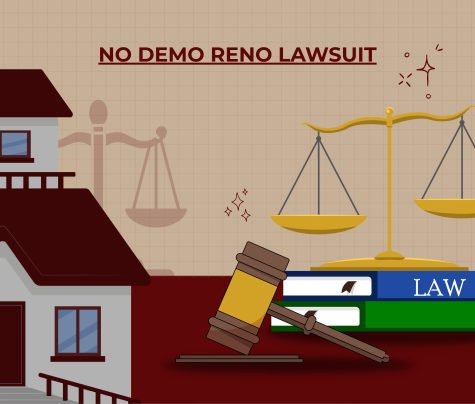


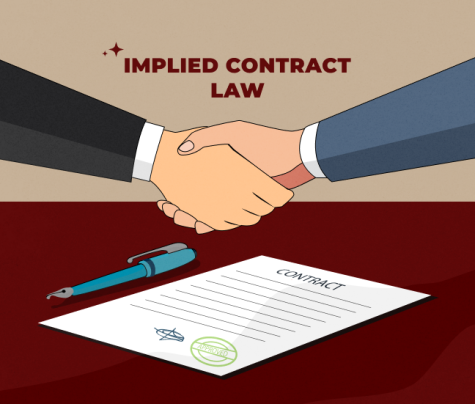
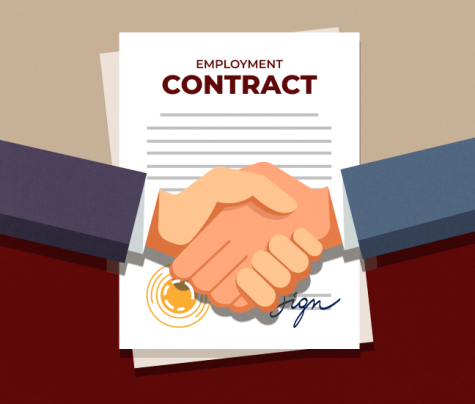
0 Reply
No comments yet.